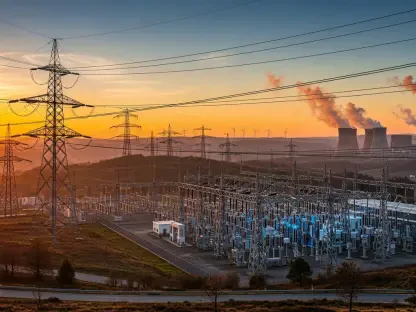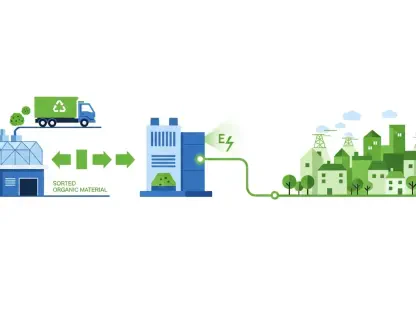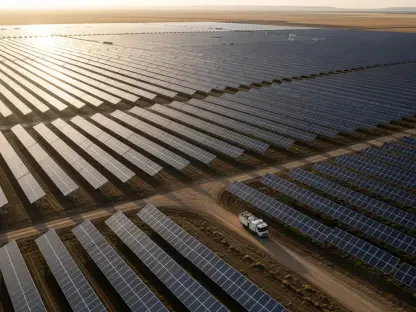In the ever-evolving landscape of the European Union, the quest to balance competitiveness with sustainability has become a pivotal concern for urban centers. The challenge lies in fostering environments that not only bolster economic growth but also adhere strictly to sustainable development goals. The urgency of climate change, combined with the imperative to build resilient economies, has propelled EU cities to the forefront of this endeavor. Prominent among these efforts are advancements in the energy sector, particularly in the deployment of renewable energy sources (RES). This dual focus on community wealth creation and environmental responsibility defines the modern urban agenda in Europe.
Renewable Energy and Economic Resilience
Deploying renewable energy sources is central to European cities’ strategies for sustainable development, aiming to combat climate change while simultaneously stabilizing energy prices and securing access. Cities like Porto have emerged as exemplars in integrating RES into community projects. Under the leadership of Filipe Araújo, Porto initiated a plan to install 6MW of solar power in municipal social housing. The objective is twofold: to empower vulnerable families with affordable clean energy and to invigorate local economies. By involving community energy projects, these cities not only address energy poverty but also promote a localized economic stimulus, creating new job opportunities and fostering local enterprises.
However, several challenges hinder these initiatives. Limited municipal resources can constrain the breadth of such projects, while the complexity of energy topics and burdensome administrative processes can extend timelines. Porto, for example, faced a two-year delay before its first energy community could connect solar panels to social housing units. This protracted process underscores the need for streamlined administrative practices and enhanced municipal capacities to manage such sophisticated energy projects effectively.
Enhancing Local Capacity and Community Engagement
To overcome these challenges, enhancing local capacities and engaging communities are essential components of successful sustainable initiatives. Araújo suggests implementing capacity-building programs, establishing local One Stop Shops for citizen engagement, and promoting energy literacy programs. Capacity-building programs can equip municipal staff with the necessary skills and knowledge to manage and execute RES projects efficiently. Local One Stop Shops serve as centralized hubs where citizens can access information and resources related to community energy initiatives, facilitating greater public involvement and support.
Energy literacy programs play a crucial role in empowering residents with the knowledge to make informed decisions about their energy consumption and participation in renewable initiatives. By fostering a deeper understanding of energy issues among the public, these programs can drive higher engagement levels and broader acceptance of RES projects. Moreover, seamless access to financial resources is critical for the proliferation of renewable energies and ensuring widespread energy security. Integrating these strategies at all administrative levels can significantly accelerate the deployment of RES.
Legislative Support and Multilevel Governance
The integration of supportive legislative frameworks and effective multilevel governance is indispensable for aligning competitiveness with sustainability goals. The upcoming measures from the European Commission, namely the Citizens Energy Package, the Clean Industrial Deal, and the reformed EU Cohesion Policy, represent significant opportunities for EU cities to align their economic and environmental objectives. These initiatives aim to create a more resilient and democratic energy landscape by ensuring equal energy rights and fostering the inclusion of local governments in decision-making processes.
Cities must be empowered to participate in the legislative process actively, ensuring their unique challenges and perspectives are addressed. This collaborative approach would enable better resource allocation and governance mechanisms, facilitating the synchronization of competitiveness and sustainability objectives. Legislation that guarantees equitable energy rights across Europe can lay the foundation for a more resilient and inclusive continent. By adopting comprehensive and cohesive policies, EU cities can leverage these frameworks to drive forward their sustainability and economic agendas.
Moving Forward with Integrated Strategies
In the dynamic landscape of the European Union, balancing competitiveness with sustainability has become a crucial focus for urban centers. The challenge is to create environments that promote economic growth while strictly adhering to sustainable development goals. The urgency of climate change and the need to build resilient economies have positioned EU cities at the forefront of this initiative. Notable among these efforts are advancements in the energy sector, especially the deployment of renewable energy sources (RES). This dual emphasis on community wealth creation and environmental responsibility defines the modern urban agenda in Europe. Sustainable urban planning includes elements such as enhancing green spaces, promoting public transportation, and implementing energy-efficient building practices. By incorporating these strategies, EU cities aim to not only meet immediate economic needs but also ensure long-term ecological balance, exemplifying a model for future urban development globally.









